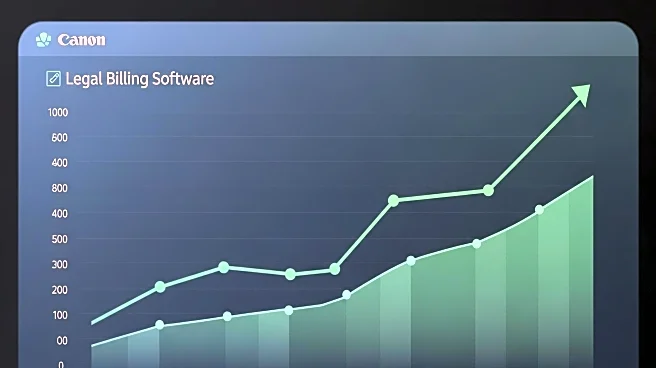What's Happening?
The global legal billing software market is projected to reach a valuation of USD 3.2 billion by 2031, growing at a compound annual growth rate (CAGR) of 9.5% from 2025 to 2031. This growth is driven by increased adoption of digital solutions in the legal sector, which aims to streamline financial operations, ensure billing accuracy, and enhance client transparency. Legal billing software automates processes such as time tracking, expense logging, invoice generation, and trust accounting, integrating with case management and document automation systems. The shift towards digital transformation has accelerated the adoption of cloud-based and mobile-enabled billing solutions, allowing real-time monitoring and secure client access. Key features include LEDES invoicing, compliance management, and analytics-driven reporting, which improve efficiency and profitability. The market is seeing increased investment in AI-based time capture, predictive cost estimation, and smart invoicing solutions that enhance accuracy and client satisfaction.
Why It's Important?
The expansion of the legal billing software market is significant for the legal industry as it addresses the growing complexity of legal operations and the demand for automation. By integrating analytics into financial management, these solutions offer enhanced transparency and compliance, which are crucial for maintaining client trust and regulatory adherence. Small and medium-sized firms benefit from subscription-based models, while large practices deploy enterprise-grade systems with AI-powered predictive billing and automated approval workflows. The increasing focus on transparency, audit trails, and compliance continues to drive modernization of billing processes across jurisdictions. This growth also reflects broader trends in digital transformation, impacting how legal services are delivered and managed, ultimately benefiting clients through improved service delivery and cost efficiency.
What's Next?
The legal billing software market is expected to continue its growth trajectory, with cloud-native and SaaS models fueling accessibility and scalability. Firms will increasingly manage distributed teams and hybrid workflows efficiently, supported by AI-based time capture and predictive cost estimation technologies. Regional growth is anticipated to be strong in North America and Europe, with Asia-Pacific emerging as a high-potential region due to expanding legal tech ecosystems and digital adoption among law firms. Mergers, acquisitions, and collaborations among technology providers are shaping a competitive landscape focused on interoperability, compliance, and data security. As firms prioritize cost efficiency, transparency, and technology-driven billing excellence, the market is poised for steady growth through 2031.
Beyond the Headlines
The legal billing software market's expansion highlights the ethical and compliance dimensions of legal practice management. As firms adopt these technologies, they must navigate challenges related to data security, privacy, and regulatory compliance. The integration of AI and analytics into billing processes raises questions about the accuracy and fairness of automated systems, necessitating ongoing scrutiny and adaptation to ensure ethical standards are upheld. Additionally, the shift towards digital solutions may influence cultural aspects of legal practice, as traditional methods are replaced by technology-driven processes, potentially altering client interactions and expectations.











